- Home
- China Miéville
This Census-Taker Page 6
This Census-Taker Read online
Page 6
The teacher and he went into the shadows to the edge of the rubbish hole. Daylight reached inside the fabric of the hill but that rip was perfectly dark. The woman shone down a light. I pressed my back against the rock wall.
I thought of my mother’s hands hauling her up. Of her climbing all grave-mottled and with her face scabbed with old blood, her arms and legs moving like sticks or the legs of insects, or as stiff as toys, as if maybe when you die and come back you forget what your body is.
“You see anything?” the teacher said. She stepped back and shrugged.
“Look,” the man said. He took the flashlight and tilted it so the beam climbed from the hole as I imagined my mother doing with her face wrong and fungus in her hair. “What’s that?”
“No,” the woman said. “That’s moss or something.”
He squinted. “Well,” he said. He turned to me. “So.” He looked helpless. “There’s no way down.”
I made myself go forward till I could see white residue on the rocks.
“He’s cleaned it,” I said. “My mother must have banged it and got blood on it when she went.”
My father leaning carefully down with a sudsy mop. Soap-water wetting what was below. Down inside the hill, a second hill: a mound of trash and corpses decaying in layers and coated in hill dust in the dark. At its top, like a triumphant climber, my mother, looking sightlessly up at me with soap in her eyes.
“Why would he clean bare rocks?” The teacher wasn’t being cruel. She didn’t understand me and was trying to talk me out of terror.
She whispered to the hunter. He looked at me and sat cross-legged with the abyss at which I couldn’t stop staring behind him. “Now listen,” he said to me. “So. My friend—”
She interrupted. “Colleague.”
“My colleague. She has the law in those books. You can’t just punish people on say-so.” He didn’t sound practiced at this soft voice. “You say your mother’s down there. You see we can’t go down there. So put a light on a chain and lower it to see? How deep does it go? How much does it twist on the way? We won’t see anything.”
I imagined that glint descending like a star falling slowly toward my mother.
“It’s what you say against what he says,” the man continued. “And we do have the letter.”
“She ain’t write that,” Drobe said. “Come on.”
“His father says she did,” the teacher said.
“What if he said something about you?” the hunter asked me. “What if he said you stole something or you killed a person, and we just said, ‘Oh, well then, if you say so, we’ll do law on him, then.’ You wouldn’t like that, would you? That wouldn’t be fair.” He looked over his shoulder into the black.
“She did write it.”
That was my father’s voice.
He was stood at the cave mouth next to the window-cleaner in his sash. I saw my father and I couldn’t breathe and I couldn’t feel my hands. He looked straight at me and I made a noise in my throat.
Drobe stepped between us. Later I remembered that and I loved him for it.
“What did you bring him for?” the hunter shouted. “I said we’d come when we were ready, didn’t I?”
“He wanted to come see,” the window-cleaner said. “What should I stop him for?”
“For fuck’s sake.” The hunter shook his head.
“What?” said the other man. “You got something to say to me? Say it to me.”
“I did, didn’t I?” the hunter said. “I said, ‘For fuck’s sake.’ ”
“She wrote that letter,” my father said. He was speaking to me. “We were fighting,” he said. He blinked repeatedly and I could feel his tremendous worry. He took a step toward me and I lurched back and Drobe moved to meet him.
“She was good for me,” my father said, “and I was good for her too, but not in the end.” He looked beseeching. “I’m sorry you saw it. You shouldn’t have. I was asking her not to leave, is what you saw. For you and me. For you more than me even because you needed her. I know that, I know. I wanted to stop her, I’m sorry I couldn’t. But you mustn’t go. You mustn’t go.”
He seemed to see Drobe at last, standing in his way. My father whispered to him, “Move.”
His voice was sudden and different and cold and Drobe instantly obeyed.
“I’m sorry your mother went away,” my father said to me. “I’ll make sure we’re all right, you and me.”
—
When he understood that they wouldn’t take my father to jail and they wouldn’t take me from him, Drobe screamed at the officers. Samma would probably just have got hold of me and walked away in any direction until they’d reached her, maybe hit her and taken me back. Drobe did shout at them that they were wrong, bastards, and so on.
I ran outside. The window-cleaner caught me easily. The hunter and the teacher with the law books huddled with my father in the tunnel and spoke to him too low for me to hear.
“We can’t just take you,” the hunter came and said to me eventually. “He didn’t do what you said.” He said that quickly.
“Lock him up,” Drobe said. “When the police next come they can go down there and look.”
“No one can go down there,” the teacher said.
“There’s no one there,” my father said. He sounded almost too exhausted to speak.
I said something about the customer who’d come and argued.
“Smail?” my father said. “Is that who you mean? Oh, son.
“I don’t know his second name,” he said to the others. “Smail. He came for keys. He was already on his way. He’d left, and he made sure he’d pass my house. He wanted one key to get money, one so he could travel quickly, and one for a disgusting thing, so I wouldn’t make it for him and he shouted. But I did make him the travel key. Only that one. And he went on. Ask anyone. Ask his friends. They’ll tell you he always wanted to get away, and he did. There’s no one in the mountain.”
“You,” the hunter said slowly to him. He looked at me and said it loud, as I listened. “We’ll come back.”
“You should come back,” my father said.
“I fucking mean it. We’ll send someone up and you’ll show us the boy so we know you’re treating him right.”
“Yes.” My father nodded with abrupt rage. “You should. Look at me. You should come back.”
The window-cleaner was looking into the sky, at the waning light. Drobe ran to me.
“I’ll come and get you,” he whispered. But the teacher was calling him and he had to turn.
The window-cleaner descended with the woman beside him. They still kept glancing up at the sun. Behind them went Drobe, watched by the hunter.
It was he, the last man, who looked back at me most, more often even than the boy.
There is a kind of thorned bush that thrives on the hill where I was born. I’ve never seen it anywhere else. It stands about a meter tall, with compact snarled branches that grow in dense near-cylinders so its copses are like low, snagging pillars. Its all-year berries are blue-gray but in the red light of sunset their luster makes them shine like black pupils.
I stood among the columnar bushes watched by their nasty vegetable eyes.
My father didn’t look at me. He dropped more stones upon a random-looking cairn. The townspeople were slow to get out of our sight. He waited and watched them and didn’t look at me and kept adding to the substance of the hill with the substance of the hill.
When Drobe looked back a last time his eyes and mouth widened in horror at my expression. He would have taken a step back toward me but the hunter put his hand on him, not cruelly but removing hope of escape. The man whispered to Drobe and Drobe made some sign for me with his hands but I didn’t know what he was saying.
When they were gone I stayed behind my perimeter of sentry bushes in the failing light.
“I’m not angry,” my father said.
I was full of the injustice of it; that that was how he tried to reassure me.
/>
“It’ll be all right,” he said gently. He stepped closer. “I’m sorry about it all.”
I didn’t move: I had no moving left in me. My father stood with only one line of thorns between him and me. He held out a hand.
And I was alone with him on the cold hill and I could do nothing. I stayed still as long as I could as if something might happen but it didn’t, and when it didn’t I shuffled as slowly as I could out from the vegetation, I dragged my toes against the ground but it was as if there was nowhere to go but to him.
He smiled as I came. He looked as if he might cry.
“Hello again,” my father whispered.
He kept his hand out until I took it.
His skin was tough and warm. I felt sick to touch it.
“Come on,” he said. “I’ll feed you. Come home.”
That first night alone with my father I sat in the kitchen without hope.
He cooked, glancing at me as I waited speechless and deflated like an empty bag. I almost felt too empty to be afraid until the night came all the way on and I lay in my cubby room listening for the sound of my father coming up the stairs, imagining him at my door, between his and my mother’s empty room, looking at me as if I was something curious, looking at me and not at me at the same time. I stared at the ceiling that was the attic floor, growing dizzy. I imagined my father watching me as if I was something that he should make stop moving.
I don’t remember sleeping. The next day I was slow and twitchy. I didn’t know what to do or what was to happen.
My father would make keys. I?
“Are you going to play?” he said.
He fed me again. Put food in front of me as the gray light came up, that is, though I couldn’t eat it. “I’m working all day,” he said. “This is for you for later. Don’t go too far.”
While he cut metal I opened the door to my mother’s room.
There were no covers on the bed frame, no books on the shelves or surfaces, which had been swept, so there were no dust marks where any books had been.
I walked our home’s perimeter of earth. What do you do on a day like that?
I wanted to see the letter again, as if staring at it might help me, but I didn’t know where it was.
Several times that day my father shouted for me from the house’s front step. He didn’t do so angrily: just checking, making sure I was close. He would make me answer.
I drew marks on a rock with the end of a stick I burned for that purpose. At a certain point they became letters and then words. I can’t remember what I wrote, which seems strange to me now. I wrote whatever I wrote, and stood back and threw pebbles at the words, looking for a particular parabola, an exact curve.
If they hit them, I thought, it means I can go.
The first throws went wide. I kept trying. When one of my stones arced up to land right exactly on what I’d written I felt squeezed inside, as if it were the writing that pulled the stones in.
He called me when the sun went down. One day had passed. I watched as the dark spread and I listened to him and I felt cold all over again. I smeared away everything I’d put down on the rock before I obeyed him. I left my slate, the stone page the hill put out for me, unreadable.
He brought me a drink of sweet herby milk while I lay in bed and he stared at me until I drank it. I hoped it wasn’t poison. He watched me with desperate fondness.
—
I found the letter, folded behind a jar on a high shelf in the kitchen where it can’t have been a surprise that, tiptoed on a chair, I’d find it. I read it several times and learned nothing and put it back. Sometimes when my father was not in the house, I would look at it again.
There came to be noises on the hill that were new to me. I thought birds of a kind I didn’t know might have come to live there, birds that called with rapid percussive clicks or trod heavily and quickly over twigs or pecked them hard. I climbed higher than I’d ever gone to see if I could find them but the thin cold air and ugly trees and rock cuts diffused the snapping sound so I could never track it.
I ran and climbed as I wanted but every few hours my father would lean out and abruptly call my name until I responded, so I had to stay in earshot. On that hill, on the flint on which we lived, that was some distance.
Each time I entered it the room beside mine was less and less my mother’s. I had a few of her books, but they’d been mine too, at least to use, in my care, by the time she gave me them outright by leaving, so I never felt I was connecting with her when I opened them.
The days changed and the view from what had been her window became mine. I climbed into its frame as I had once in the attic that I didn’t want to enter again. When the wind made my house lean and creak at night, I’d look up and imagine that the sounds were made by my mother shaking the walls in the upper room, staring at where the blood had been, that my father had cleaned away. I still tried to keep her face from my mind, and sometimes I succeeded and she looked at me with my father’s face or the rotting doll’s.
Once as I sat at what had been her window in cold late light I heard two shots in fast succession. They came from somewhere on the stone slopes.
At the first I didn’t even move; I was used to the sound of shotguns. What followed it, though, was a sharper ugly echoing crack like the amplified snap of dry wood. It made me start and look wildly through the glass at the flocks of birds as spooked as I.
I waited, but nothing more came.
When my father shouted for me from the front door I still hadn’t left the house and I surprised him by descending from behind him, down the stairs. I was surprised in turn because two downhillers stood on our doorstep: a thin nervous man I didn’t recognize with one of the ribbons of temporary office on his shoulder and a revolving pistol in his hand, and the sour-looking teacher.
My father looked at them, past them to the horizon for long seconds, then faced me. He was angry.
“How are you?” the woman shouted at me.
I backed away from the door and nodded without speaking.
She came in while her companion fidgeted with his weapon. She looked in my eyes and mouth and asked me whether I was all right, whether anything had happened, while my father watched and listened.
When they left she said to him, “You be careful.”
He closed the door more slowly than usual, so as not to slam it.
When he ladled out supper my father said, “Did you hear the gun today? That loud shot?” I nodded. “Not heard that noise for a long time.” He frowned. “Could be there’s new hunting, maybe.” He opened the door and looked out while midges joined us. “I used to hear that all the time,” he said. “When I was in a war. In a city.” Not the nearest one, I knew.
The boy said, “Who won?”
“High town against low?” the boy’s father said at last. “Street against street? Who won?” He looked at his son without expression. “They won. That shot? That’s the kind of shot you use to kill a man.”
That night I ran away.
It was very cold and I put on my heaviest clothes to descend the stairs and step as silently as I could onto the flat rock around our house and onto the path, to come down that hill. I shook hard with every step, even with all those layers. I was dry and dusty. In the very far distance, in the steppes on which I’d never trodden and to which I rarely paid attention, lightning soundlessly connected sky and earth. My skin felt like old paper.
I didn’t feel brave walking that path, though I had no flashlight and I strained to see by a slice of moon. If I’d stepped onto scree or braced against the wrong rock I might have started to slide and not been able to stop, and if there was no fence below me at that point I might have kept descending until I went over an overhang into a gulley, falling to my death.
By day there’s rarely anything on the hill that would take you, but whether or not there are those things about which the bridge gang asked me, there are predators after dark, the nightcats and others. They might hunt a child. Coyot
es and pumas wouldn’t enter the streetlit town but they might have investigated me on my way to it. I don’t remember feeling fear or determination or anything but as cold and as drab as the earth as I came down.
A clattering made me stop. No animal came, but standing in the dark where the path on my little mountain widened and grew shallower in the angle of its descent, I heard that percussive scratching. What I’d thought the sounds of new birds, closer now, as if something was bringing up gravel in short coughs. I didn’t move.
On that hill, there were none of the true succulents of the desert, that I knew from pictures, that I’d once imagined walking. But there were spined trees, various clotted-looking things serrated as if with claws along the ridges of their bark. They surrounded the dark path and I peered between their spines.
Deep in a clag of them, I saw a human shape.
The figure seemed to approach me like someone rising out of water, a hulk of shadow with a box and a gun. It seemed to surveil me, and move without moving.
I hollered and I ran.
I didn’t know if I’d seen anything real, because the hill will throw up its own nightmares, and I didn’t care, just ran in great terror and didn’t look behind me.
Nothing seemed to follow, but I didn’t slow.
When at last I came slap-footed and quaking into the bridgetown it was still deep night. There were few people in the streets, dim but definite figures visible at junctions at work in their economies. They looked at me in curiosity. They couldn’t have seen my face and it wasn’t as if there were no ragged children in the town, nor as if none ever went walking in such forbidding hours. No one called to me.
I took a twisting route, striving for silence, returning to the bridge over the cut, to Samma and Drobe’s favorite house.
My hope was met: the door opened. I stood in the threshold. My eyes were wide and I felt as if they might shoot out rays for me to see by. I stood half-in half-out, unsure how to proceed, and Samma opened her own eyes to look at me.
“Oh, you,” she said. “It’s you.”
She rose and came for me. She was sleepy and vague and she held out her hand and whispered to me with more tenderness than I’d heard from her or anyone, now it was only she and I awake and she was unheard by the tough brood she helped shepherd.

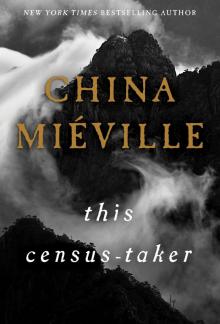 This Census-Taker
This Census-Taker Jack
Jack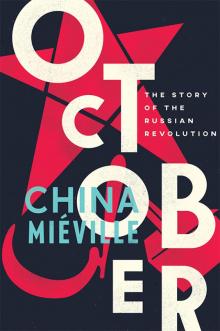 October: The Story of the Russian Revolution
October: The Story of the Russian Revolution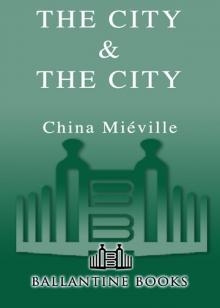 The City & the City
The City & the City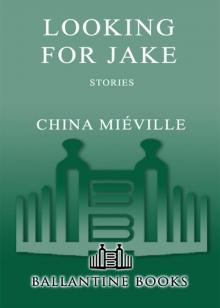 Looking for Jake: Stories
Looking for Jake: Stories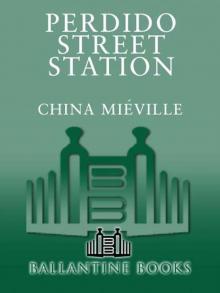 Perdido Street Station
Perdido Street Station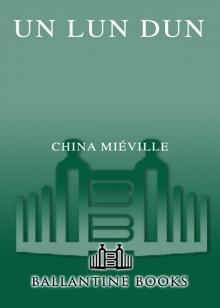 Un Lun Dun
Un Lun Dun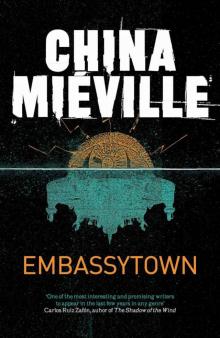 Embassytown
Embassytown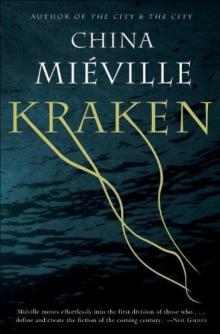 Kraken
Kraken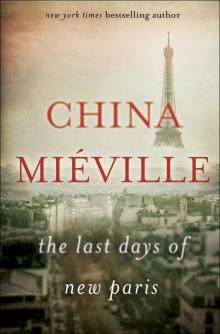 The Last Days of New Paris
The Last Days of New Paris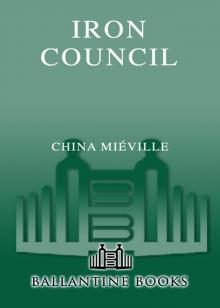 Iron Council
Iron Council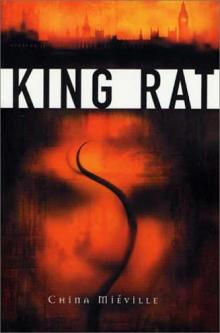 King Rat
King Rat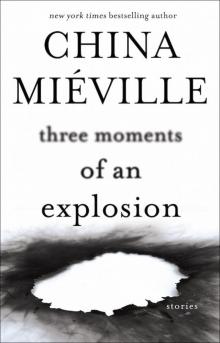 Three Moments of an Explosion
Three Moments of an Explosion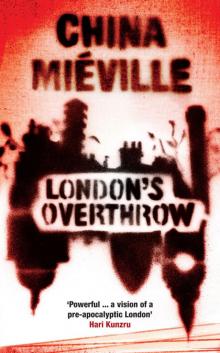 London's Overthrow
London's Overthrow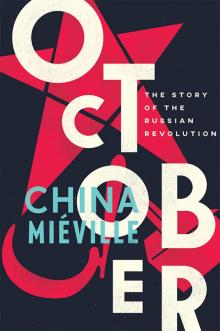 October
October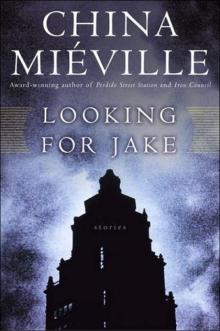 Jack (new crobuzon)
Jack (new crobuzon)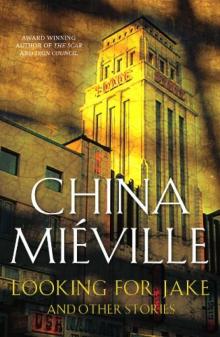 Looking for Jake and Other Stories
Looking for Jake and Other Stories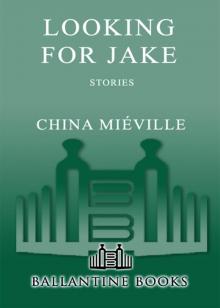 Looking for Jake
Looking for Jake